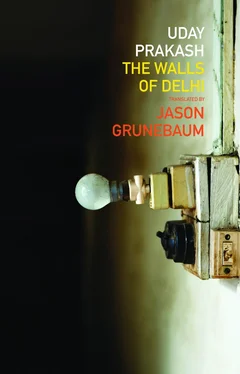Astrologer Pandit Deendayal Upadhyay set up shop to the right of Sanjay’s, and just a few steps away from Madan’s. He spread out his square of cloth on the sidewalk. I approached him and told him the whole story, changing what needed to be changed to remain discreet. The astrologer-ji told me this: If Jupiter, in the third house, aligns with Mars, while in the sixth house, Mars first aligns with Venus, then Jupiter, and then, by luck, it’s the fourth or ninth lunar day of the waning moon, and a moonless night, and Delphinus is visible, then Kuvera, the god of wealth, will stir the senses of a man, and what this all adds up to is that there’s a great likelihood of stumbling on some buried treasure, or major wealth.
Pandit Deendayal Upadhyay, originally from Baliya but now living next to the Naharpur sewage runoff in a rented tin shack, warned me. All planets and constellations were conspiring against me in the most dreaded alignment; Saturn was rising and casting a dark seven-and-a-half year shadow over my life, and I would soon face the full wrath of the government.
I think that Kuvera must have been in the right position last year, on Tuesday, 23 May, that made the change in Ramnivas’ luck possible. Think about it: a simple whisk broom sweeps up the trash. The twine holding the bristles together gets loose, and the bristles need to be righted, so he beats the broom against what looks like a normal wall. And he finds a huge cache of cash. How? Think about it: for a few months he entered a fantasy land, getting everything his heart desired. He was able to give his wife, Babiya, and two kids, Rohan and Urmila whatever they wanted to eat and whatever clothes they wanted to wear. And he was able to take his teenage mistress to the other side of a shimmering, technicolour rainbow, where they got to see the Taj Mahal and have their pictures taken in several different poses.
That may be the case. But the astrologer-ji was quick to add that if the manna was, in fact, dark and dirty from the stain of sin, the result would be disastrous. What do I believe? I believe that somewhere around midnight on 26 June 2001, the sin, or vice, or bad karma attached to that money caught up with Ramnivas once and for all, bringing him and his dreams to a violent end.
And you ask me: so what’s the big secret you want to tell me? Why use this story as a cover, and hide the secret behind it?
You already know that only a few lakhs of rupees were recovered from the trunk after Kuldip aka Kulla and Ramnivas were killed on Ridge Road that night — and a large part of that cash was counterfeit too. And yet, we know that there was at some point three billion rupees taken out of that wall.
The police officer who supervised ‘Operation Ramnivas’ is a respected and powerful cop who owns a few homes and has one of those farm houses outside Delhi perfect for all-night parties. And when he throws one, he invites politicians, high-ranking cops, journalists, top intellectuals, and a few senior literary figures. They drink until they fall down on the floor. I’m sure you’ve seen their photos in all the local Delhi papers. These people are no longer like you or me — they’ve helped turn each other into name brands. If you read any poetry or stories coming out these days, you know what I mean when I say that you can smell the stench of liquor coming from the words they write. And underneath their sentences lies a pile of chicken and goat bones, and the skeletons of the innocent ones. If you poke the head of your broom into contemporary literature, you’ll find a hollow wall stuffed full of money — impure, dirty money.
I’ve been in Delhi for some twenty-five years, and I’m scared. I suspect that Ramnivas told the cops that he’d told me the secret about the hollow wall in Saket, and you know how much danger that puts me in.
It doesn’t matter how many days I’ve got left in this sorry life before I also disappear — but I, too, would also like to enter into a world of my dreams, just like Ramnivas did.
So that’s why every night at midnight, when all of Delhi is asleep, I put on some black clothes, sneak out of the house with a pick in one hand, trowel in the other, and spend the rest of the night scraping out the walls of Delhi. Treasures beyond anyone’s wildest dreams are hidden in the countless hollows in Delhi’s countless walls. I’m sure it’s there, and I’m sure all of it is unmarked. My only regret is that I’ve wasted the last twenty-five years of my life. Even if I’d only taken twenty-five days to see what’s inside the walls of Delhi, I’d be a billionaire by now, and I’d be able to live my life with a little respect.
So if you read this story, go and pick up a little pickaxe and trowel and get yourself to Delhi right away. It’s the only way left to make it big. If you would rather live by hard work, the straight-and-narrow, following your dreams, using your talent, believing in yourself, keeping faith — if that’s how you want to lead your life, you’ll die of hunger, and the cops will never leave you alone. You probably don’t know about that judge in Maharashtra who declared that the Indian police and the criminals and goons of the land are one big lawful family.
In the meantime, I’ll settle down with the beggars, the lepers, the smackheads, the transients, and the other forgotten ones, I’ll stretch out, and sleep among the dismembered statues of the old English rulers that lie scattered in Coronation Park. I’m broken in the same places, with my bad back and bone tuberculosis. Whenever I have free time, I go to the shrine of Hazarat Nizzamuddin, just past the Delhi Zoo, and sit for hours on the marble floor of the dargah, repeating the words that the sufi saint, Auliya — Hazarat Nizzumaddin — once spoke to the then ruler of Delhi, Ghayasuddin Tughluq. Delhi is still far away. Tughluq summoned Auliya to explain why the sufi saint was visited by more people than was Tughluq’s court. Delhi is still far away. Auliya declined the summons, just as he had with all the other kings he’d seen come and go. Delhi is still far away. Tughluq left on a military campaign in the south to let Auliya think it over. Delhi is still far away. Auliya’s followers warned him to leave Delhi; Tughluq had threatened to behead Auliya if he disobeyed the summons. Delhi is still far away. The night before returning to Delhi, Tughluq and his men set up camp just outside the city. Delhi is still far away. That’s the night Auliya uttered the sentence I keep on repeating. After he spoke it, Tughluq, drinking and carousing, died right at the Delhi border when the tent he was in collapsed. That place is now known as Tughluqabad.
Amir Khusaro’s tomb is also at Auliya’s shrine — the man who wrote the first lines of poetry in what we now call Hindi — and who, in his own lifetime saw eleven kings, their courts, and their hangers-on, all come and go. If you go and look at the guest book that Sayid Nizami keeps at the shrine, you’ll see my name.
Believe me when I say that I am praying not only for me, but for the well-being of all of you, and for that of my dear country. Have faith that my prayers will reach all the way to Auliya’s ears.
So long as the police or other powers-that-be in this city don’t frame me for something, I’ll use my pickaxe and trowel to find the wealth hidden in Delhi’s countless walled hollows.
And if you want to get lucky, come to Delhi right away — it’s not far at all. Forget about being a millionaire; coming to Delhi is the only way left to scrape by.
The other ways you read about in the papers, and see on TV, are rumours and lies, nothing more.
For comrade Virendra Soni, with the hope that he will stand with Mohandas ’til the end
Читать дальше










